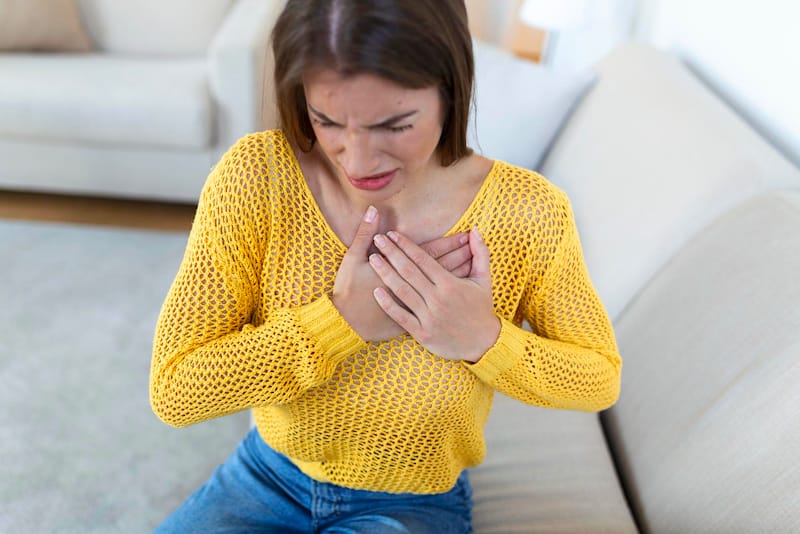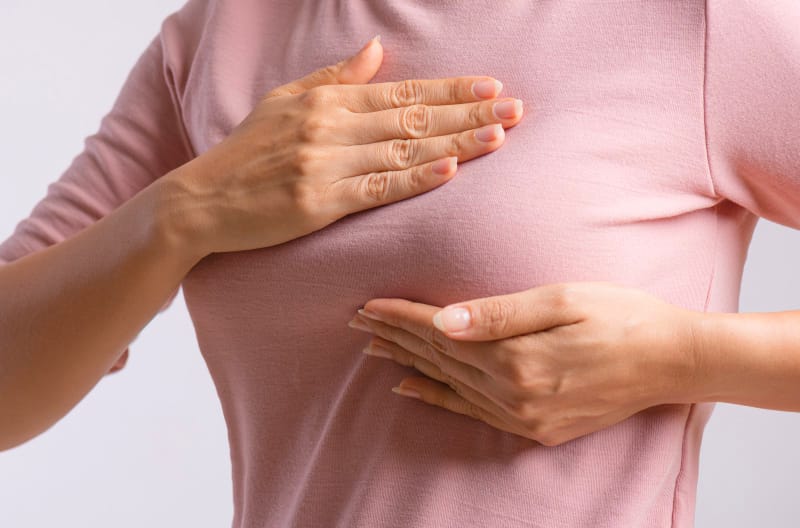Having a cold feeling in one or both breasts or a tingling sensation could get your mind to think about all kinds of things. Getting the most common misconception out of the way is not a symptom of breast cancer. With breast cancer, it’s the opposite; the breasts get warmer than usual. Sometimes consuming large amounts of cold or raw foods or drinks could give you cold discomfort around the breast area due to poor circulation in the breasts.
Six possible reasons why you get a chill feeling in your breasts

- Bra fit – According to a study on this topic in 2008, 80% of women wore the wrong bra size, either too big or too small, which could affect the blood flow around your breast. Poor blood circulation may cause a cold sensation, just like if you wear a ring on your finger that is too tight.
- Muscle strain – Pectoral muscle strains are common in athletes and weight lifters, but they can easily happen to anyone. It is directly beneath and around your breast. When you strain this muscle, the pain can feel like it’s coming from inside your breast and is usually limited to one breast. Typical household activities like raking, shoveling, or even lifting your baby can lead to a pectoral strain.
- Period symptom – Doctors call this cyclical breast pain because it’s directly associated with your menstrual cycle. Most female breast pain results from hormonal changes. Estrogen and progesterone fluctuate throughout the month, resulting in all sorts of changes in your body and your brain.
- Pregnancy signs – Sore, swollen, cold breasts and nipples are the first indicators of pregnancy, appearing even before a menstrual cycle is missed. It is linked to hormonal changes in the body, the areola also seems to be bigger and more pigmented, and there may be nipple soreness and tingling sensations.
- Breastfeeding – An improper latch can cause a lot of pain, especially when they first start breastfeeding, and it isn’t uncommon for nipples to become dry and cracked. Sometimes it could lead to lactation mastitis, engorgement, plugged ducts, or fungal infections if not treated immediately.
- Hormone medications – some hormone medications, such as oral contraceptives and birth control pills, contain the reproductive hormones estrogen and progesterone, which could have breast pain and tenderness as side effects.
How to treat cold feeling on breast
If the reason for your breast discomfort is any of the above, here are some simple remedies that could help ease your pain.

Speaking to your local health consultant to get the medical attention you need is also advisable for situations where further tests might be required.
- Find your perfect bra fit. Most of the time, we have to go back to basics and check if we are overlooking something simple that is causing the problem. It is pretty normal, too, for women to neglect these types of things. Worrying about more “important” matters tends to put our basic needs on the back burner, which should stop.
- Pectoral strains can be treated at home with enough rest, Ice, Compression, and Elevation (which helps reduce the inflammation of the injured tissue allowing for a quicker recovery time. A massage can also help reduce swelling in the area.
- If your breast discomfort is caused by your period, you can take an OTC pain reliever. Nonsteroidal anti-inflammatory drugs like ibuprofen and naproxen treat pain and reduce swelling. You can also apply a heat compress to relieve the pain, avoid caffeine and minimize salt intake, which contributes to water retention and swelling in the breasts.
- Breast pains caused by pregnancy are a little tricky since it is a part of the changes your body is going through getting ready to host a baby. A heat compress or cold compress might help, and changing into maternity bras would be a good idea.
- Breastfeeding is a whole other discussion on its own. There is no other way to describe it as a beautiful sacrifice for a baby to get the best possible nutrition available to them. Coming from my personal experience, what you need is a lot of patience and to condition your mind on what pain is to expect, what is bearable, and what needs help.
- Setting up a routine for feeding and expressing milk manually could help prevent the breasts from engorging.
- Nipple protection silicon is available if yours is already chapped from previous feedings. Nipple ointments would also help to ease the pain.
- Warm compress and massage the area around plugged milk ducts to avoid more discomfort.
- For breast pains caused by hormonal medications, please consult your doctor and tell them how it affects your overall health.
FAQs
When should I see a doctor about this concern?
It is always a good idea to see your doctor, and you don’t have to wait for the “worst” symptoms before calling them in for help.
But for breast concerns, set an appointment with your doctor if, besides the breast discomfort, you also have lumps, skin dimpling, nipple discharge, and severe, long-lasting pain that interferes with your normal activities.
What is nipple vasospasm?
Vasospasm happens when the blood vessels supplying the nipple go into spasm and reduce the blood flow to the nipple.
This affects the flow of milk from the nipple. It is common to feel intense pain if this happens, particularly if the weather is cold.
Conclusion
Worrying about any changes in our bodies allows us to reassess and find cures to our discomforts before it gets worse.
It’s a normal response to overanalyze too, so it is always best to consult a medical professional to get the best possible solution or treatment for your concerns.


